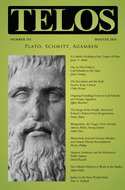Jeffrey Bussolini’s “Ongoing Founding Events in Carl Schmitt and Giorgio Agamben” appears in Telos 157 (Winter 2011). Read the full version online at the TELOS Online website, or purchase a print copy of the issue here.
 This article considers ongoing founding events in the work of Carl Schmitt and its interpretation by Giorgio Agamben. The term refers to decisive “events” in Schmitt, which, although they may be exceptional (or perhaps because they are), play a continual role in generating and maintaining the political order. These events are not merely mythic or imaginary devices to describe politics, like the social contract and the veil of ignorance. These events are crucial, in Schmitt’s terms, for understanding “concrete reality.” His idea that the event of decision generates sovereignty, and the related formulation of the friend-enemy distinction founding the political order, are the initial and best-known examples of this argument, and they form a paradigm for considering other instances of this kind in his work and that of Agamben. The article contains five subsections considering events that have enduring effects on the political order. The term “ongoing founding events” calls attention to the persisting action and effect of these events, distinguishing them from historical turns or developments which don’t seem to have the same degree of internal necessity for contemporary politics. In addition to multiple interrelations between them, these five aspects share the evental structure of the exception as described by Schmitt and its special epistemological status for understanding concrete reality and the norm itself.
This article considers ongoing founding events in the work of Carl Schmitt and its interpretation by Giorgio Agamben. The term refers to decisive “events” in Schmitt, which, although they may be exceptional (or perhaps because they are), play a continual role in generating and maintaining the political order. These events are not merely mythic or imaginary devices to describe politics, like the social contract and the veil of ignorance. These events are crucial, in Schmitt’s terms, for understanding “concrete reality.” His idea that the event of decision generates sovereignty, and the related formulation of the friend-enemy distinction founding the political order, are the initial and best-known examples of this argument, and they form a paradigm for considering other instances of this kind in his work and that of Agamben. The article contains five subsections considering events that have enduring effects on the political order. The term “ongoing founding events” calls attention to the persisting action and effect of these events, distinguishing them from historical turns or developments which don’t seem to have the same degree of internal necessity for contemporary politics. In addition to multiple interrelations between them, these five aspects share the evental structure of the exception as described by Schmitt and its special epistemological status for understanding concrete reality and the norm itself.



